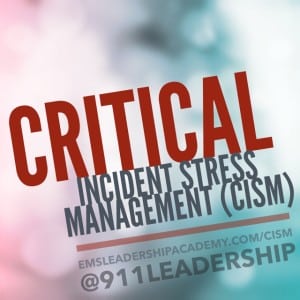Critical Incident Stress Management For Emergency Medical Services
Guest contributor: Johanna Flanigan, RN & Retired EMT
 Have you ever returned from an intense call and felt you didn’t do enough to help that patient? Have you ever laid in bed at night unable to sleep because all you are seeing and thinking about when you close your eyes is that last call you were on? Have you responded to a serious call and it has brought you back to a call you were on years ago? If you answered “yes” to any of these questions, then you have experienced a Critical Incident. Experiencing such feelings is a very common response to an abnormal event and EMS certainly responds to abnormal events!
Have you ever returned from an intense call and felt you didn’t do enough to help that patient? Have you ever laid in bed at night unable to sleep because all you are seeing and thinking about when you close your eyes is that last call you were on? Have you responded to a serious call and it has brought you back to a call you were on years ago? If you answered “yes” to any of these questions, then you have experienced a Critical Incident. Experiencing such feelings is a very common response to an abnormal event and EMS certainly responds to abnormal events!
Stress is a part of everyone’s life – it’s how we cope with that stress that either makes us stronger, or makes us break down.
 However, Emergency Service Stress is a bit different, because the sights, sounds, and smells we encounter on the job are so intense at times that our normal coping strategies do not work. There are reactions physically, emotionally or psychologically that can occur and we do not know why they are happening. Education is so important in understanding why we are feeling like we do after a critical incident.
However, Emergency Service Stress is a bit different, because the sights, sounds, and smells we encounter on the job are so intense at times that our normal coping strategies do not work. There are reactions physically, emotionally or psychologically that can occur and we do not know why they are happening. Education is so important in understanding why we are feeling like we do after a critical incident.
Dr. Jeffrey Mitchell PHD studied Critical Incident Stress in the 1980’s by surveying retired Firefighters, EMS Workers and Police Officers. Common themes were identified in several areas. Worse calls for all providers included death or serious injury to a child, death or serious injury to a co-worker, multiple casualties, and harm to self or night-time calls. Personality traits of emergency service workers such as being obsessive-compulsive, rescue oriented, highly dedicated, a serious need to be needed by others are all common traits.
Different people can have different reactions to a stressful call or multiple stressful calls. Physical reactions can range from the inability to sleep or eat, increased blood pressure and pulse, headaches, or stomach complaints. Psychological reactions may be anger, depression, or withdrawing from others. Cognitive reactions often are the most troublesome. Nightmares and flashbacks of the call tend to make the rescuer feel afraid they are having a mental breakdown.
“Any or all of these reactions are NORMAL reactions, which NORMAL people have to an ABNORMAL event.”
Most of the critical calls experienced by Emergency Service Workers are events that non –emergency workers will never witness. The sights, sounds, and smells can remain with emergency workers for a long time also. Again, normal reactions that normal people have to an abnormal event.
What are some healthy things the rescuer can do to lessen the stress?
- Exercise is very important to increase the endorphins in the body and wear off all the adrenalin that is racing. Eating and drinking healthy is a better way to cope, rather than drinking alcohol or caffeine in excess, or binging on sweets and chocolate.
- Talking to supportive peers and family helps many people.
- Participating in a Critical Incident Stress Debriefing is also very therapeutic-talking out your concerns to those involved in the same incident is not only educational, but also supportive.
There are different components in a Critical Incident Stress Management Program.
A defusing is a group discussion of those involved in a particular call immediately following or up to 48 hours of a critical incident. Quick facts are shared by the facilitator what rescuers should expect in the next 24-48 hours. This session only last about 30 minutes.
Formal Debriefings are held 48 hours or longer after an incident and only the workers involved in the call attend. Debriefings can last up to two hours depending on the number of people participating. Everything said in a defusing or debriefing is confidential. There is no note taking and what is said in the room stays in the room. Teams that follow the Mitchell Model will always have a mental health professional participating as a team member. Mental Health Professionals are trained in leading groups and to assist with any problems that may occur during the process. Peer support personnel validate participants’ feelings and emotions as “one who has been there”. Education is so very important for personnel to really understand what critical incident stress is and how to cope in healthy ways.
No one ever knows when a Critical Incident will occur. No one ever knows what call might effect them in a negative way. What we DO know, is that any reaction to a critical incident is a normal reaction to an abnormal event. If the usual coping mechanisms mentioned above do not work, and symptoms last longer than 4 weeks, then professional help might be needed.
Our minds are like video cameras-they capture all kinds of sights throughout the years. Knowing that there is help and that these reactions are normal reactions that normal people have is certainly a relief.
Find out and know where your resources are should you ever need their support.




Johanna Flanigan’s leadership and care of EMS responders has long been unparalleled. Pre-hospital EMS has never had a better cheerleader.